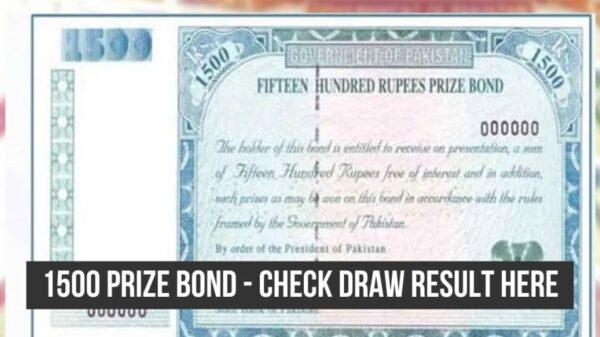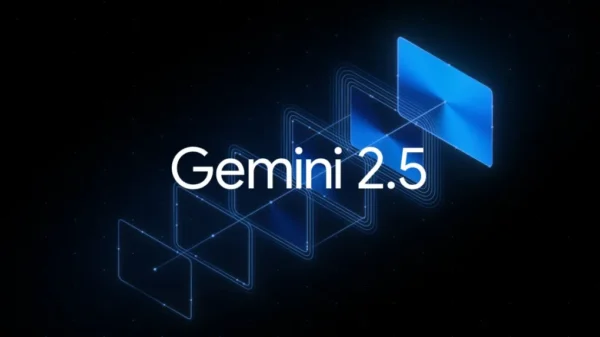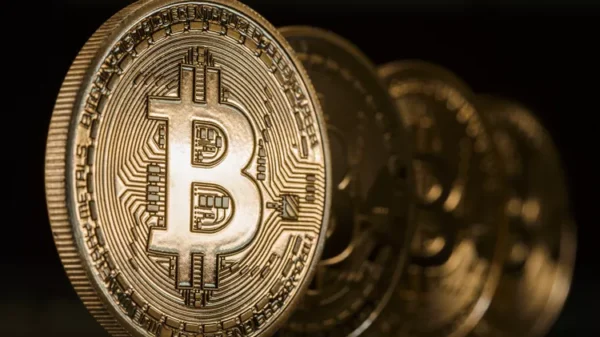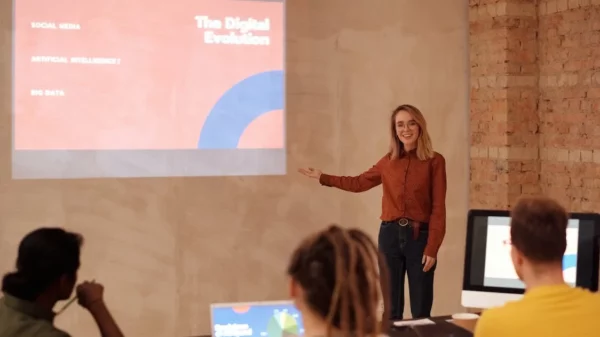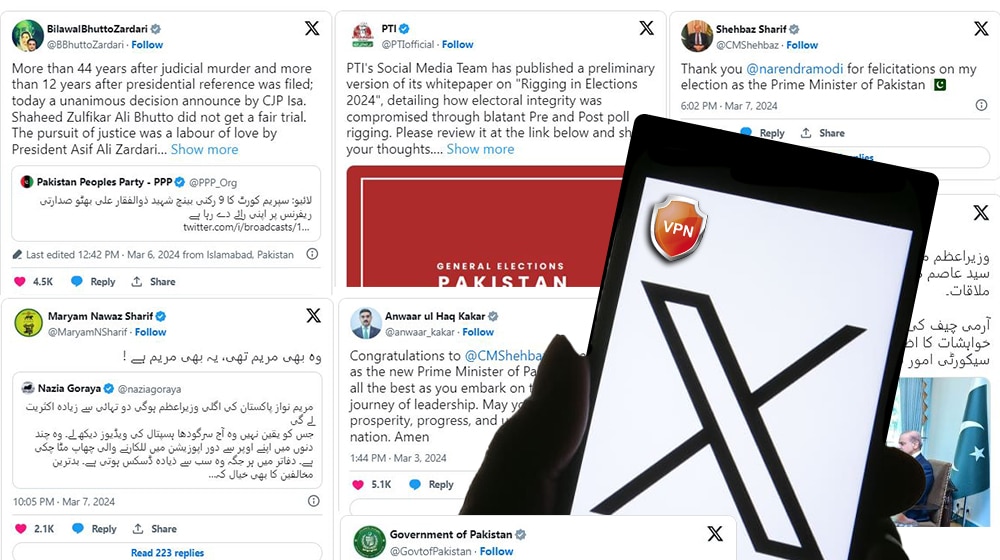X is Blocked in Pakistan Only for the Economically Disadvantaged
Although X is currently under lockdown in Pakistan, it appears that the ban is close to becoming insignificant with just the presence of a hashtag.
Despite the government’s firm position against “illegal content,” virtual private networks (VPNs) are in high demand, and X is abuzz with tweets from various political perspectives across Pakistan.
In the previous month, X has evolved into an exclusive online VIP lounge in Pakistan, with only the economically disadvantaged being excluded, left stranded outside the virtual access barrier. Meanwhile, the VPN-savvy affluent class enjoys unrestricted access from within.
وزیراعظم محمد شہباز شریف سے چیف آف آرمی اسٹاف جنرل سید عاصم منیر، نشان امتیاز (ملٹری) کی وزیراعظم ہاؤس میں ملاقات۔
آرمی چیف کی وزیراعظم کو منصب سنبھالنے پر مبارکباد اور نیک خواہشات کا اظہار۔ ملاقات میں پاک فوج کے پیشہ ورانہ اور سیکورٹی امور سے متعلق بات چیت۔ pic.twitter.com/uvyUKCVXN8
— Government of Pakistan (@GovtofPakistan) March 6, 2024
In the midst of this uproar, one may question: where is the government’s firm stance on social media regulations? Despite citing worries regarding inappropriate content, users on X are expressing themselves rapidly, highlighting the paradox between concerns over digital speech and the reality of its expression. This complex situation leaves many puzzled, with no clear victor in sight.
Former interim Prime Minister Anwaar ul Haq Kakar remained undeterred by the ban on X, posting tweets about his tenure in office and extending congratulations to Shehbaz Sharif on his appointment as Prime Minister – all while using a VPN, naturally.
Congratulations to @CMShehbaz on being elected as the new Prime Minister of Pakistan. Wishing you all the best as you embark on this important journey of leadership. May your tenure bring prosperity, progress, and unity to our beloved nation. Amen
— Anwaar ul Haq Kakar (@anwaar_kakar) March 3, 2024
Advertisement. Scroll to continue reading.
Not to be outdone, PM Sharif also used VPN to respond to his well-wishers. He thanked his Indian counterpart Narendra Modi post-swearing-in.
Not a single tweet about the X ban or how it was hurting the tech sector. He used a VPN.
Received a congratulatory call from my brother H.E. Dr. Ebrahim Raisi @raisi_com, President of Iran. We reaffirmed our resolve to work closely for the betterment of our countries and the region. 🇵🇰 🇮🇷
— Shehbaz Sharif (@CMShehbaz) March 7, 2024
Thank you @narendramodi for felicitations on my election as the Prime Minister of Pakistan 🇵🇰
— Shehbaz Sharif (@CMShehbaz) March 7, 2024
Dr. Umar Saif, a Harvard-educated IT professional and former interim federal minister for IT & Telecom, succumbed to the temptation of VPNs, posting a harsh tweet on X to counter a newspaper’s criticism of his accomplishments during his tenure. Like many others, he couldn’t resist utilizing VPNs for access.
Truly disappointed by Dawn’s editorial today.
In just 5 months:
The IT industry export revenue grew by over 32%. We did major reforms to allocate 300M Hz spectrum to double the capacity of the telecom infrastructure in Pakistan; allocated frequency to introduce 5G in…
— Umar Saif (@umarsaif) March 6, 2024
Referring to prominent figures, newly elected Chief Minister of Punjab, Maryam Nawaz Safdar, is actively using VPNs to express her post-election thoughts.
Advertisement. Scroll to continue reading.
More than 44 years after judicial murder and more than 12 years after presidential reference was filed; today a unanimous decision announce by CJP Isa. Shaheed Zulfikar Ali Bhutto did not get a fair trial. The pursuit of justice was a labour of love by President Asif Ali Zardari… https://t.co/rTNgLWeood
— BilawalBhuttoZardari (@BBhuttoZardari) March 6, 2024
Pakistanis are puzzled, while government officials are frantically providing one excuse after another to justify why X continues to be restricted for users in Pakistan.
In the midst of the political uproar on social media, one fact remains unchanged: the prohibition of X continues, prompting Pakistanis to flock to VPNs in droves – a surge of 6,000 percent since February 17, 2024.
Following the initial occurrence of a “national-scale disruption” last month, citizens have turned to virtual private networks (VPNs) at an unparalleled pace, experiencing a surge of 6000%.
During her inaugural term in public office, Chief Minister Maryam Nawaz Safdar utilized a VPN to express her thoughts via tweets following last month’s elections. However, she has not addressed the ban on X or its adverse impact on Pakistan.
وہ بھی مریم تھی، یہ بھی مریم ہے ! https://t.co/SIROmMDtVv
— Maryam Nawaz Sharif (@MaryamNSharif) March 7, 2024
The scenario has evolved into a farcical digital debacle, with X being compared to an exclusive club inaccessible to the economically disadvantaged. Meanwhile, across the virtual realm, politicians ranging from the Prime Minister to Chief Ministers are fervently tweeting, as if their political influence hinges on it.
Accounts of political parties have been the most active outside the civilian pool, posting tweets and notes on last month’s electoral process. All tweets were made via VPN.
لائیو: سپریم کورٹ کا 9 رکنی بینچ شہید ذوالفقار علی بھٹو صدارتی ریفرنس پر اپنی رائے دے رہا ہے
https://t.co/i9SFiln29F— Pakistan Peoples Party – PPP (@PPP_Org) March 6, 2024
Advertisement. Scroll to continue reading.
وزیر اعلیٰ پنجاب مریم نواز شریف چیف جسٹس لاہور ہائیکورٹ کی تقریب حلف برداری میں شرکت کیلئےگورنر ہاؤس پہنچ گئیں
گورنر پنجاب محمد بلیغ الرحمن اور سینئیر صوبائی وزیر مریم اورنگزیب نے استقبال کیا pic.twitter.com/WFKwx2nagn
— PMLN (@pmln_org) March 8, 2024
Please note that X is still banned. Everyone is using VPNs while poor people less educated on such an option cannot. The government has nothing to say about it.
PTI’s Social Media Team has published a preliminary version of its whitepaper on “Rigging in Elections 2024”, detailing how electoral integrity was compromised through blatant Pre and Post poll rigging. Please review it at the link below and share your thoughts.… pic.twitter.com/fTrE2Ku41y
— PTI (@PTIofficial) March 8, 2024
As the proxy revolution of X continues unabated through VPNs, queries emerge: If national security is the priority, why the discriminatory application of regulations? It appears that the only thing spreading faster than tweets is the perplexity surrounding the government’s stance on digital liberties.
Nevertheless, with the rise of the VPN revolution, one may ponder: Will the government manage to assert authority over its online domain once more, or will X continue to be the elusive temptation, enticing Pakistanis to venture into the uncharted territory of VPNs? Only time will reveal the answer.
Related






